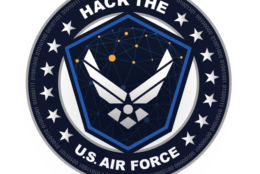Hubbard Radio Washington DC, LLC. All rights reserved. This website is not intended for users located within the European Economic Area.
On Air: Federal News Network
Bug Bounty
-
Neil Chatterjee will take over as chair of the Federal Energy Regulatory Commission, after Kevin McIntyre announced he was stepping down due to a "health setback."
October 25, 2018 -
The new Veterans Affairs Secretary Robert Wilkie said several new people will be taking top-level leadership positions at the agency shortly. Pamela Powers will be the department's new chief of staff and Chris Syrek will be VA's deputy chief of staff.
August 14, 2018 -
The Defense Department's vulnerability disclosure policy lets anyone in the world report security holes they find in the DoD system without fear of prosecution.
November 14, 2017 -
White hat hackers discovered 207 verified vulnerabilities in Air Force systems, including some very serious ones.
August 23, 2017 -
Cybersecurity competitions are drawing more attention from and becoming more popular with federal agencies.
August 16, 2017 -
Air Force cybersecurity officials worry that the rank-and-file may be too preoccupied with the nuts and bolts of compliance.
August 10, 2017 -
In this week's edition of On DoD, Peter Kim, the Air Force's chief technology officer, Alex Rice, the CTO at HackerOne, and Reina Staley, the chief of staff of the Defense Digital Service join is to talk about the latest of DoD's bug bounties: Hack the Air Force. We’ll also talk about changes in how the Army buys cloud computing services as part of a broader effort to shut down expensive, government-owned data centers.
April 26, 2017 -
The Defense Department has carved a bug bounty path that civilian agencies can follow on their own, as long as they don't try to compare their results to the same level as DoD.
March 30, 2017 -
Nearly two years after Congress passed the Cybersecurity Information Sharing Act, the intelligence community says it's laid the groundwork for a public-private cyber threat hub, but it's still far from the "cyber 911" that lawmakers and agencies envisioned.
March 21, 2017 -
The General Services Administration’s Technology Transformation Service (TTS) released a draft solicitation asking for industry input in creating a bug bounty program.
February 06, 2017 -
In November, when Army officials decided to launch the service’s first-ever bug bounty, one of the key questions they wanted to answer was whether sensitive personnel records were vulnerable to theft by hackers via the…
February 01, 2017 -
When Army officials decided to launch the service’s first-ever bug bounty, one of the key questions they wanted to answer was whether sensitive personnel records were vulnerable to theft by hackers via the Army’s public-facing websites. As it turns out, the answer was yes.
January 24, 2017 -
The federal government decided to put the Defense Department in charge of building a new information technology backbone to house and process all of the data involved in security clearance investigations, one that would be safer from foreign attacks.
December 19, 2016 -
The Defense Department undertook a significant expansion of its new crowdsourced approach to cybersecurity Monday, opening its “Hack the Pentagon” challenge to literally anyone and providing them a legal route to report any security holes they find.
November 22, 2016
















